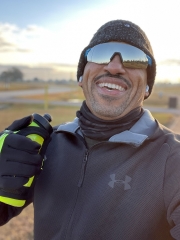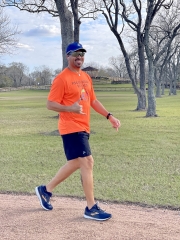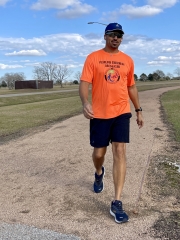The off-season
In the United States, triathlon season generally ends in early December (eg., Ironman 70.3 Florida). The first races of the year are also held in warmer regions ( Ironman 70.3 Oceanside, CA and Ironman 70.3 Texas). The 3 to 4 months between the final races and the first race of the new year is called the off-season and I’ve noticed that athletes approach it very differently. Some people do nothing and allow themselves to rest completely, while others build strength, or maintain their baseline fitness.
Although 2021 was my 2nd year of racing, this is my first structured off-season. Last year, my off-season was completely focused on recovering from a radical prostatectomy. For the majority of December, I walked around with a catheter bag attached to my leg. Then throughout January, I wore a diaper and focused on learning to control my bladder and regain some core strength. I always kept my eye on returning to racing with the hope of participating in Ironman 70.3 Texas in late March 2021. Beyond focusing on regaining the physical capability of completing an Ironman, I had no formal plans. I wanted to recover and continue my journey. Since I don’t have a long history with athletics, recovering from an injury is new to me. I didn’t know what to expect.
Mentally depleted
Ironman Florida was my final race of the 2021 season. It wiped me out. I’ve detailed the difficulties of the race in a series of posts (swim, bike, run, and the lessons). As expected I was physically tired. A few days after returning, I traveled to New Orleans to attend a scientific congress. While there, I noticed how mentally depleted I felt. Even as the soreness of my body faded, mentally, I remained tired. This feeling lasted several weeks and was a surprise to me. I didn’t try to jump right back into training. Instead, I did easy sessions while preparing for what became a disappointing run assessment and subsequent shift in training. I was about to experience my first off-season plan.
Johnny substituted one of my weekly bike sessions with a run session and reduced almost all my workouts to zones 1 and 2. Having a schedule with reduced volume and lower intensity sessions made me comfortable enough to begin fasting. Earlier in the year I learned, the hard way, that training, and weight loss don’t mix. I have to choose which one to do or neither will work well.
Fasting and food sensitivities
Feeling excited about both having easier workouts and dropping weight, I changed two of my eating habits. First, I began 16-18hr intermittent fasting. I did my best to eat dinner by 7 pm so that the fast would end around 1 pm the next day. This approach resulted in my morning sessions being done in a fasted state which helped me burn fat for energy. I only worked out fasted for sessions of 1.5 hrs or less, however. The second habit I changed was eliminating foods that my body was sensitive to. To do this, I took a blood test to identify irritating foods. Then I eliminated them from my diet for 30 days. After thirty days, starting with the least aggravating, I began introducing the foods back into my diet. Some of them were not agreeable and caused me notable bloating and discomfort. I realized that dairy and foods containing gluten caused the most aggravation. Now, I mostly avoid dairy products and am mindful of gluten-containing foods.
I found intermittent fasting to be easy to do and a perfect fit because I wanted to establish the habit of waking and completing my workouts early in the morning. As I did this, I noticed that my energy levels were high, and my weight was dropping. After three weeks, I could see changes around my midsection. My legs were also feeling stronger. Since my belt became too big and my pants were beginning to slide off, I knew what I was seeing was real. I wasn’t tracking foods, I ate to satisfy my body. Since I didn’t have large training volumes, and I didn’t feel low in energy, I wasn’t concerned with undereating. I was learning to listen to my body and strengthen my awareness of the connection to the foods I ate. I felt relieved and happy with my progress. Mentally, I was recuperating. The focus on something other than preparing for a race was freeing.
Lean, strong and focused.
By the beginning of January, I’d lost 10-12 pounds (5.5 lbs of body fat and 1.5 inches around my waist) while my thighs got 2 inches larger (circumference). Although I didn’t achieve the goal of losing 20 lbs, I’m very happy with my progress. I was able to rest and reflect on the year, improve what I eat, and optimize my body composition in meaningful ways. I’ve enjoyed eating more fruits and vegetables while decreasing red meat and fried foods. Developing the ability to be aware of how I feel when I eat opens the door to reach a new level of eating for performance. Shifting into Ironman preparation will begin very soon, and with my new awareness, I look forward to what I’ll be able to achieve this year.


















